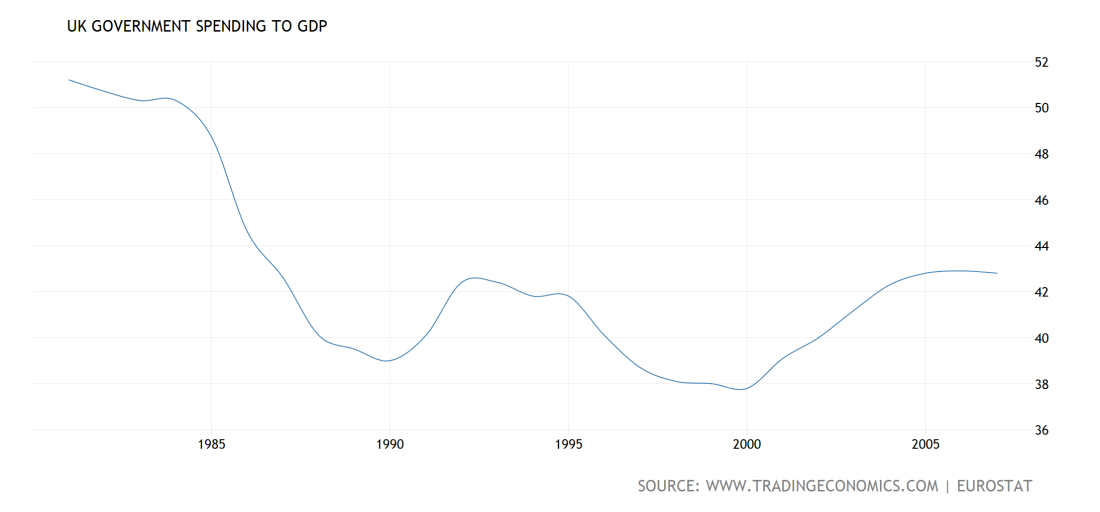British Prime Minister Theresa May has announced plans for a snap election on 8 June. She’s way ahead in the polls, and the Conservatives may win–they may win by a lot. But they shouldn’t. So I’m continuing a blog series called “Don’t Vote for the Tories.” Each post gives you a new reason to reject the Tories at the polls this June, grounded in research and data. I aim to do at least one of these each week until the vote. Today we’re taking a break from criticising the Conservatives and exploring what Labour has to offer.
The popular media narrative on Labour under Corbyn is that the party doesn’t offer a credible alternative, that it’s run by clueless hard left extremists with a microwaved 70s agenda. This has become one of those things that everybody knows because everybody says it, but it’s not reflected in the content of Labour’s remarkably modern platform.
Earlier in the series, we talked about Britain’s stagnant productivity under the Tories. British productivity took a hit during the global economic crisis of 2008, and the Conservatives’ austerity policies have prevented Britain from making the necessary long-term investments in science, technology, and infrastructure necessary to keep Britain competitive in the 21st century:
Labour’s manifesto promises an extra £250 billion in infrastructure spending over the next 10 years to resurrect Britain’s once-great rail system and provide everyone in Britain with “ultrafast” internet (over 300 Mbps), with free public wi-fi in city centres and on public transport. Labour also promises to spend 3% of GDP on research and development–up from just 1.7% under the Tories. That’s about a £3.7 billion annual increase. At the same time, they pledge to develop a highly skilled workforce by eliminating tuition fees and reintroducing maintenance grants. This will not only help British students attend university–it will also ensure they leave university with smaller debt burdens, giving them more financial flexibility to build start-ups and take risks.
Under private ownership, many British utilities have begun acting like monopolies, offering only very limited consumer choice while taking advantage of their market power and the essential nature of the services they provide to extract high rents from the British people. Because they face no meaningful competition, they have no serious incentive to use the rent they extract to improve the quality of infrastructure, instead handing it out to wealthy shareholders. Many of these shareholders aren’t British, so the rents they extract often do not even stay inside the British economy. In recent years the electrical network has become so dilapidated that British newspapers frequently report on how little spare capacity there is. This is both because the private system under-invests in new high tech power generation, but also because it stores and delivers what electricity it does generate too inefficiently, such that much of what does get generated is wasted.
To make these essential services more accountable to the people rather than foreign shareholders and facilitate the public sector investment needed to bring these systems up to date, Labour plans to restore rail, power, water, and mail services to public ownership. Some people get spooked by the notion of nationalisation, but public ownership has worked in Britain in the past and is working in other European countries. In Scandinavia, national governments often cooperate together, pooling their resources to build truly elite rail and electrical infrastructure. Sweden’s trains are better across every major statistical category:
Sweden also enjoys much lower electricity prices:
Nationalization isn’t just about nostalgia for the good old days–it’s about keeping pace in a world that’s rapidly moving to a cleaner, cheaper, more efficient future.
While Britain’s population continues to age, the Conservatives stubbornly chain NHS spending at 7% of GDP–far below the healthcare spending levels of other countries in similar demographic situations. Labour has promised to reverse the Conservatives’ reductions, boosting NHS spending by £30 billion.
British wage growth has been much weaker under the Tories than it was under Labour. Here we can see the difference in the way wages changed under the parties, normalising the initial value at 102 to make the comparison more straightforward:
In addition to investing in infrastructure and reorganising utilities to increase productivity and thereby the size of the pie from which to cut out the workers’ slice, Labour pledges to increase the relative negotiating power of workers by repealing the Tories’ Trade Union Act, increasing the minimum wage to £10 per hour, banning zero hour contracts, requiring firms to pay their interns, double paid paternity leave, and requiring all firms that do business with the government to pay their highest paid executive no more than 20 times what they pay their lowest paid worker. Alone, any one of these policies would offer workers a meaningful benefit. Together, they’re quite comprehensive.
The concern people tend to have with Labour is paying for things. Labour wants to spend on all sorts of cool stuff, but the fear is that either Labour will pay for its programs with overly burdensome taxes or it will neglect to pay for them altogether. A myth even goes around in which Labour spending in the 00’s is blamed for Britain’s economic crisis–those who perpetuate this forget that the crisis started in the United States, where banks created and began overly relying on unstable “mortgage-backed securities”:
The truth is that Labour never spent all that much, even in the mid-00s:
Labour has promised only to increase taxes on the top 5% of earners. Because British top tax rates are already quite low relative to many European countries, there’s no substantive risk of capital flight. At 45%, the current UK top rate of tax is well below Germany’s 47.5%, the Netherlands’ 52%, or Sweden’s 57%. These countries are all economically highly competitive and arguably more successful than Britain–Britain is 19th in per capita GDP, while Germany is 17th, the Netherlands is 13th, and Sweden is 11th.
Labour has promised to stick to its fiscal credibility rule, to balance day to day spending with revenue. But even if Labour fell short a bit and ran deficits, this would not be nearly as bad for the British economy as some assume. The IMF estimates Britain could double its debt burden before getting into any real trouble:

You might notice that many of the countries with even more fiscal space than the UK are also considerably to the left of Britain politically and have already implemented many of Labour’s policies. Sweden, for instance, has an extra 50 points of space. Labour’s policies have a proven history of success where they’ve been tried. They get results and they don’t put governments in impossible fiscal positions. The narrative that Labour can’t be trusted with the economy has never really been based on anything solid. If Britain is going to succeed outside the European Union, it needs policies that enable it to keep up with its European competitors. It cannot afford to demonise modern social democratic policies as “radical” simply because they’re espoused by Jeremy Corbyn. Labour’s platform is genuinely serious and worthy of consideration. Nobody has to vote Conservative.
Previous entries in this series:
- Don’t Vote for the Tories: They’re Clueless on Wages
- Don’t Vote for the Tories: They’re Destroying the NHS
- Don’t Vote for the Tories: They Provide Weak, Unstable Leadership
- Don’t Vote for the Tories: They’re Strangling the Unions for No Good Reason
Subsequent entries in this series:




